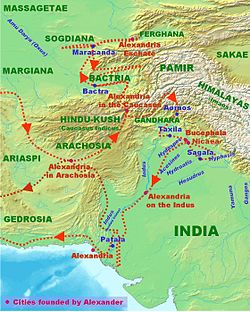Mallian Campaign
| Alexander's Indian campaign | |||||||
|---|---|---|---|---|---|---|---|
| Part of the Indian campaign of Alexander the Great | |||||||
 Alexander's Indian conquests, with the Mallian campaign at the confluence of the Hydraotis and the Hydaspes |
|||||||
|
|||||||
| Belligerents | |||||||
| Macedon | Malli | ||||||
| Commanders and leaders | |||||||
|
Alexander the Great Hephaestion Peithon |
various | ||||||
The Mallian Campaign was conducted by Alexander the Great from November 326 to February 325 BC, against the Malli of the Punjab. Alexander was defining the eastern limit of his power by marching down-river along the Hydaspes to the Acesines (now the Jhelum and Chenab), but the Malli and the Oxydraci combined to refuse passage through their territory. Alexander sought to prevent their forces meeting, and made a swift campaign against them which successfully pacified the region between the two rivers. Alexander was seriously injured during the course of the campaign, almost losing his life.
The campaign against the Malli occurred a year after Alexander crossed the Hindu Kush, and eight years after the start of his campaigns against the Persian Empire. At this time, his conquests stretched from Greece into India; some of the Indian tribes had previously been part of the Persian Empire. The political situation in Greece was quiet.
Alexander had defeated King Porus at the Battle of the Hydaspes in May 326 BC, and then stayed in his territory for thirty days. During this time, he reconciled King Porus and his other vassal, Taxiles, with each other, as they were both to be his new vassals. Alexander achieved this by arbitrating their disputes and then arranging a family alliance. He then marched north-east toward the Glaukanokoi, and received the submission of their thirty-seven cities. Abisares of Kashimir submitted to the Macedonians as well, and gave them many gifts, including forty elephants. Alexander proposed to march further east to the River Ganges and fight the powerful empires of the Nanda and the Gangaridai. According to Arrian, he expressed his thoughts thus;
Now if anyone desires to hear where our warfare will find its end and limit, let him know that the distance from where we are to the river Ganges is no longer great; and this you will find is connected to the Hyrcanian sea; for the great sea surrounds the entire earth. I will also demonstrate to the Macedonians and their allies not only that the Indian gulf is confluent with the Persian, but the Hycranian gulf is confluent with the Indian.
...
Wikipedia
